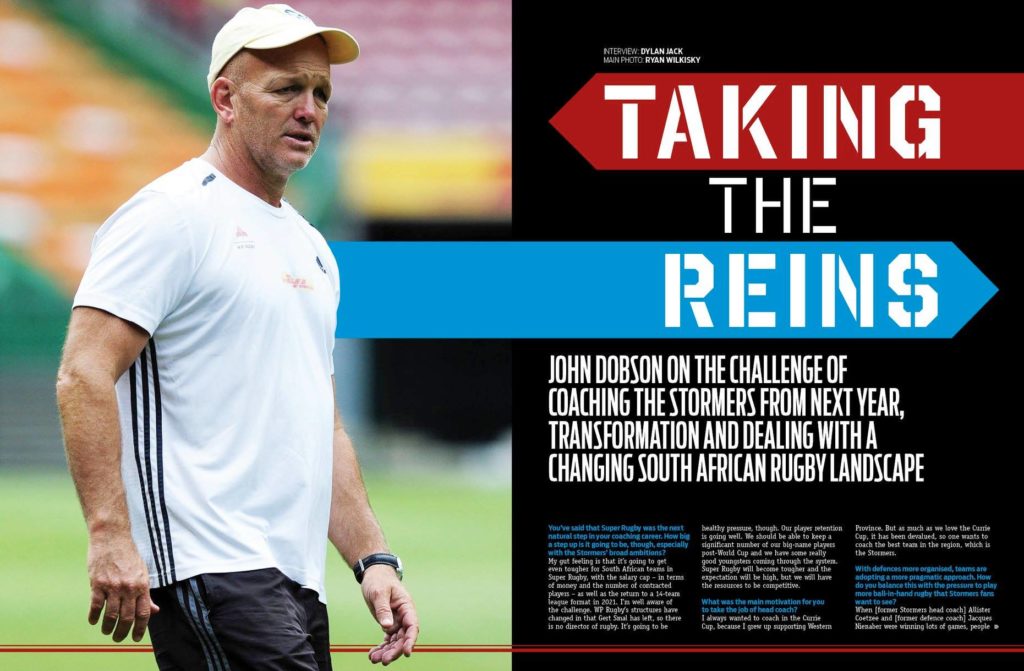John Dobson chats to DYLAN JACK about the challenge of coaching the Stormers from next year, transformation, and dealing with a changing South African rugby landscape.
You’ve said before that Vodacom Super Rugby was the next natural step in your coaching career. How big a step up is it going to be, though, especially with the Stormers’ big ambitions?
My gut feeling is that it’s going to get even tougher for South African teams in Super Rugby, with the salary cap – both in terms of money and the quantity of contracted players – as well as the return to a 14-team league format in 2021. I’m well aware of the challenge. WP Rugby’s structures have changed in that Gert Smal has left, so there is no director of rugby. It’s going to be healthy pressure, though. Our player retention is going well. We should be able to keep a significant number of our big-name players post-World Cup and we have some really good youngsters coming through. Super Rugby will become tougher and the expectation will be high, but we will have the resources to be competitive.
What was the main motivation for you to take the head coach job?
I always wanted to coach in the Currie Cup, because I grew up supporting Western Province. But the Currie Cup, as much as we love it, has been devalued, so one wants to coach the best team in the region, which is the Stormers.
With defences more organised, teams are adopting a more pragmatic approach. How do you balance this with the pressure to play more ball-in-hand rugby that Stormers fans want to see?
When [former Stormers head coach] Allister Coetzee and [former defence coach] Jacques Nienaber were winning lots of games, people weren’t happy because we weren’t getting four-try bonus points. There are a couple of things that we should consider. When you look at the stats, the Crusaders kick more than other teams, but they tend to play four or five phases before they kick, and those tend to be attacking kicks. I think it’s more about trying to manipulate the back three by pulling the opposition wings up and then kicking.
How will your coaching team change?
Dawie Snyman, Norman Laker and I have come a long way together and have been made part of the succession plan. But Super Rugby coaching teams are around five or six, so there will be some new people. A clear mandate from WP Rugby – and it is the right mandate – is to look at a more transformed coaching environment. Transformation obviously has traditional meaning, but it also means to transform our thinking. There will definitely be some new blood in the coaching staff.
How do you feel about the Stormers’ transformation record?
It’s obvious that we need to present a better picture on the coaching front. The development of, and giving opportunities to coaches of colour are very important performance indicators in my contract. As I said, it’s the right thing to do. Player-wise, we have led the country in Super Rugby as far as transformation is concerned, naturally. I can’t, in my eight or nine years at Western Province, recall any interference or choosing a player purely on their skin colour. We just have to make sure in the new contracting cycle that we give enough opportunities so that we can move forward.
How important is it to ensure the Stormers properly blood their younger players this year to ensure that they are not thrown into the deep end next year, when some big names could have left?
It’s going to be a balancing act for Fleckie [head coach Robbie Fleck] because this team is a culmination of a four-year cycle. This was always going to be the year that we were going to get as far as we could in the competition, despite what happened at Loftus in the opening round. The blooding of players has happened quite naturally. There’s no pressure to blood players for the sake of 2020. This year is the focus. It’s happening organically, which is great for us.
Do South African rugby’s financial struggles put pressure on coaches to bring younger players through faster to fill the gaps when experienced players take overseas contracts?
It’s a massive issue. Rassie Erasmus is doing the right thing by recalibrating the market and our player salaries, because they were bordering on the obscene. They wouldn’t be obscene if the industry was growing. We are in a recession or depression in the southern hemisphere. We have a situation where our revenues are substantially declining, yet player salaries are going the other way. It’s going to take us two or three years of pain, reflected in the domestic rugby market with guys going overseas, but we can’t not have a competitive national team. Our challenge now is to coach harder to upskill players. There are substantial challenges ahead.
What are your thoughts on SA Rugby’s new contracting model? The Vodacom Bulls are set to cut up to 100 contracts, especially among their junior players. How will it affect the Stormers?
We don’t have as big a playing base as the Bulls. It’s a challenge, though, because we are going to drop down to 45 players, and there are some guys who are contracted until 2020, so you have to honour those contracts. There are no plans to retrench players, we will just not be able to do as many renewals. We need to be more forensic, so we have the right 45 players. The old days of contracting a player to help out in the Currie Cup and be a squad player will now be a luxury. We do have a massive bailout with three universities in the Varsity Cup – Maties, UWC and UCT – who are producing some wonderful talent. Our high-performance guys will be working with them to broaden our player base and make sure those players can play professional rugby.
WP Rugby is perceived as a poorly run union. How do you keep the players’ focus on what happens on the field and not in the boardroom?
I know they don’t enjoy seeing the headlines, but I also know they are quite used to it. The key thing, throughout all these reports of financial woes, is that they have never been paid late. In any business, if you start missing salary runs, that’s when employees get affected. For all the trials and tribulations, that has never happened here. My job as the coach is to keep the team, no matter what else is happening out there, as tight as possible.
How much communication is there between the franchises and Erasmus?
We are not used to this amazing level of openness and cooperation. It’s world-class. Rassie is trying to remove that old provincialism, which is a legacy of the apartheid days. It’s quite exciting. I’m not sure if he will coach beyond this year, but at least with him as SA Rugby director of rugby, we will still have access to his openness and expertise.
Do you have any Bok coaching ambitions?
With regards to head coaching, this Stormers job is the zenith of my ambition and probably what fits South Africa. But if there’s ever a chance of helping the Boks in the things that I am good at later, I would love to do that.
Where would you like to leave the Stormers when your contract expires?
We have traditionally been the best-supported franchise in the whole of Super Rugby. I want to get the people back to Newlands. To me that is through the style of rugby and winning. I would like the Stormers to be getting 40 000 spectators for some big derbies. Our name should also be respected throughout the world. If we are competing in finals and the people are coming back to Newlands then I would have achieved my goal.’





